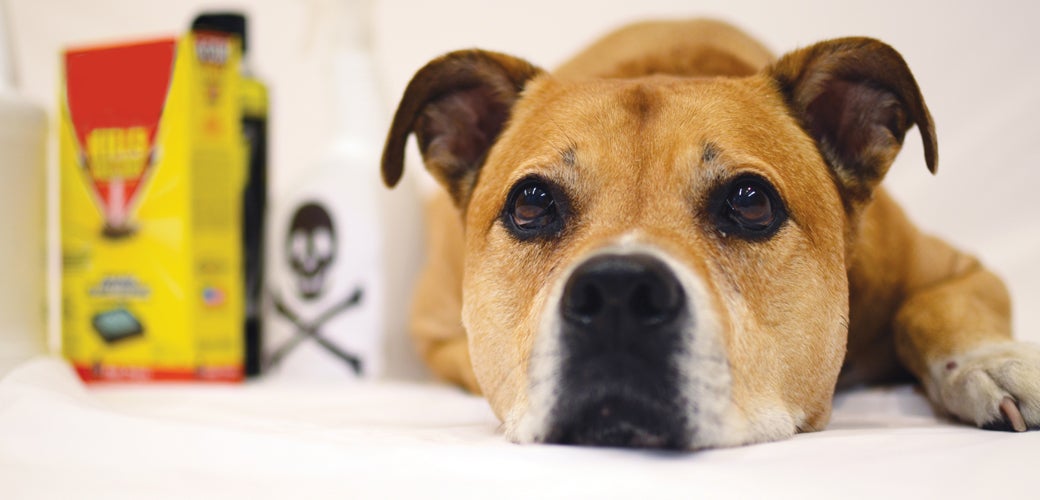
Pet Poisons: Be Mindful of these Household Products and Cleaning Agents

As the health and safety of ourselves and our friends and family remains top-of-mind, we want to remind you to always consider your furry family members safety as well. It’s important to remember that products that are intended to clean surfaces and keep us safe from viruses and bacteria, might not be so safe for our pets. The ASPCA Animal Poison Control Center (APCC) has created the following guide to help you know which cleaning products to keep out of paws’ reach.
1. Bleach
Pet parents are often curious about the risks associated with cleaning their pets’ cages and toys with bleach.
The bottom line is that cleaning your pet’s cage or toys with a properly diluted bleach solution, followed by a thorough rinsing and airing out, is not expected to cause harm. If the odor of bleach seems overwhelming, open windows and use fans to air the room.
There are many cleaning products and disinfectants on the market, with a variety of ingredients for cleaners, with varying degrees of safety. Always follow label directions for usage. After cleaning, ensure you dispose of unused or dirty solutions, and clean and put away cleaning implements like mops in areas your pets won’t have access to. If your pet seems overly interested in a freshly mopped area or cleaned counter, guide them to another part of the house while the surfaces air out. If you have questions about the appropriate selection or application of a product, please contact your veterinarian or the manufacturer before cleaning.
2. Carpet Fresheners
Proper use of carpet deodorizing products should not cause significant harm or injury to pets. Should your pet accidentally come in contact with the freshly applied powder, we recommend washing the paws with mild soap and water to avoid minor skin irritation.
Minor ingestions of carpet freshener may result in a mild stomach upset. If a small amount is inhaled, minor respiratory irritation may occur, resulting in sneezing, coughing or a runny nose. It’s a good idea to keep pets out of the room until after you have vacuumed up the powder.
3. Carpet Shampoo
Most carpet cleaning products can be used in pet households. Allow the carpet to dry before allowing pets into the area. This will help to prevent the risk of skin irritation or gastrointestinal upset.
4. Essential Oils
Cats are especially sensitive to essential oils, and effects such as gastrointestinal upset, central nervous system depression and even liver damage could occur if ingested in significant quantities and concentrations. Inhalation of the oils could lead to aspiration pneumonia. Toxicity varies among specific oils so we wouldn’t recommend using any essential oils in areas where your pets have access, unless pets are supervised or the use of the oil is approved by your veterinarian.
5. Fabric Softener Sheets
Fabric softeners contain cationic detergents, which have the potential to cause issues for your pets like drooling, vomiting, oral and esophageal ulcers and fever. These clinical signs require treatment by a veterinarian. Oral ulcers can develop if a pet chews on a new, unused dryer sheet. If an animal ingests enough sheets, new or used, an intestinal blockage may occur.
6. Febreze®
Contrary to rumors alleging that Febreze® causes serious illness or death in pets, our veterinary toxicology experts at APCC regard these fabric freshener products to be safe for use in households with cats and dogs. As with any product, it is important to always follow label instructions for use.
Should your pet accidentally come into contact with Febreze when it is still wet, we would not anticipate problems beyond mild skin irritation or minor stomach upset, if it is ingested.
7. Grout
Grout sealers vary widely in toxicity, from non-toxic to alkaline corrosive. Alkaline products can cause drooling, vomiting, oral and esophageal ulcers. Confirm the ingredients in the brand you are using and call the APCC or your veterinarian if your pet ingests some of the sealer. Dried or cured sealer generally only causes a mild upset stomach if ingested.
8. Swiffer® Wetjet®
Swiffer® Wetjet® products do not contain cleaning agents in large enough quantities to present serious health risks to pets. Our toxicology experts evaluated the product and determined it doesn't contain ethylene glycol from antifreeze contrary to rumors and is appropriate to use in homes with pets.
Like any product, it's important to read and follow label instructions to avoid unnecessary exposure to pets. As with any number of cleaning products, mild skin irritation or stomach upset may occur if pets walk through a wet floor or lick any solution.
9. Toilet Cleaning Tablets
Ingestion of diluted toilet bowl cleaners would not be expected to cause problems beyond minor stomach upset, should a dog take a drink of the diluted water in the toilet bowl. However, gastrointestinal problems could occur from drinking stagnant toilet water, so it’s still a good idea to discourage your dog from lavatory libations!
10. Vinegar and Water
A solution of vinegar and water is used as an inexpensive alternative to commercial cleaning agents. Vinegar is typically acidic and can act as an irritant. Ingesting concentrated or undiluted vinegar can cause vomiting, diarrhea, oral irritation and pain.

Most cleaning agents can be used safely in homes, as long as label recommendations are followed. It’s important to ensure that you keep cleaning products up and out of paws’ reach and keep your pet out of the area when using any potential toxic substances. If you suspect your pet has been exposed to any poisonous substances, contact your veterinarian or call APCC’s hotline at (888) 426-4435 immediately.
